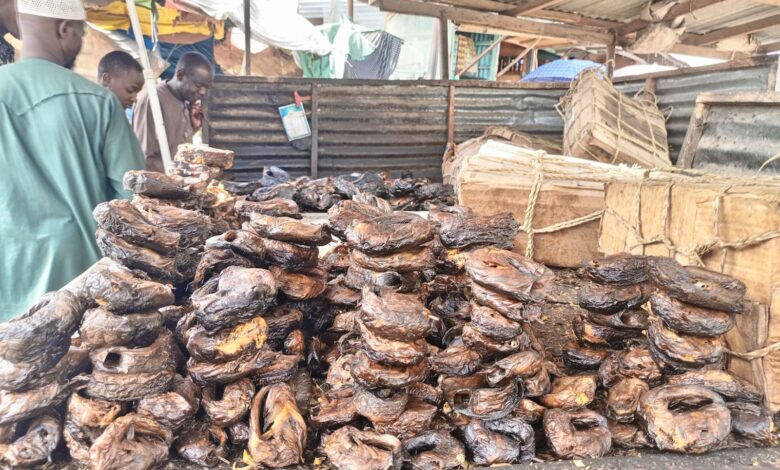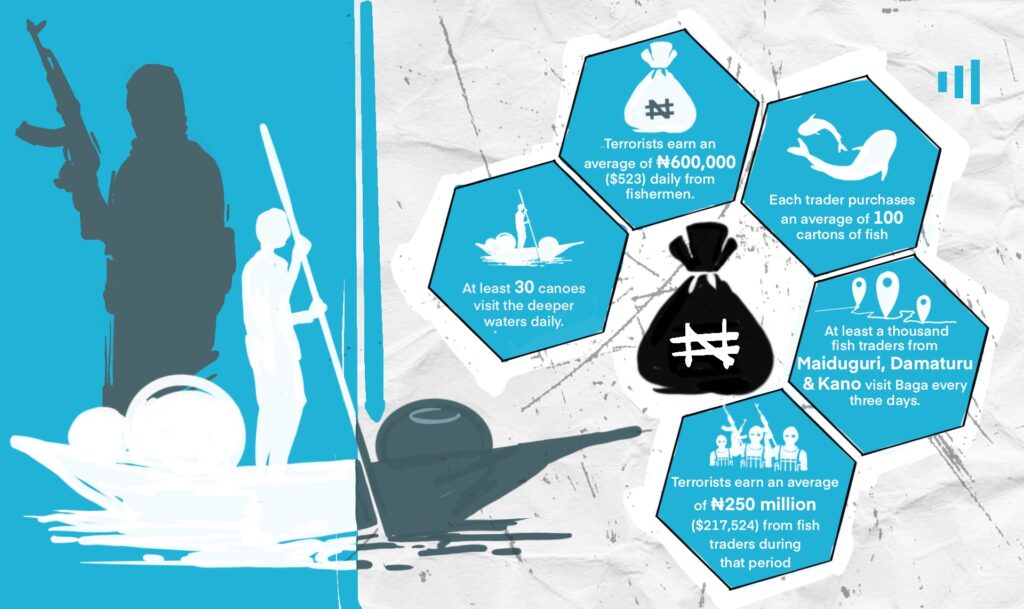Fishermen In Nigeria’s North East Either Pay Levies To Terrorists Or Risk Assault, Death
Estimates from those affected indicate that the terrorists operating in Baga earn up to ₦600,000 daily from fishermen and ₦250 million every few days from traders.

Standing on the shores of Lake Chad in Baga, Nigeria’s North East, 41-year-old Yusuf Usman and his son, Ibrahim, tidied their canoe and fishing net. The previous day, they had received a preorder for some cartons of smoked fish. While Yusuf checked to ensure the canoe, paddle, and fishing net were in good condition, Ibrahim double-checked to ensure their gate pass—some cash—was secure. “We cannot access the deeper waters until we pay a levy to the terrorists,” Yusuf explained.
The terror group Islamic State West Africa Province (ISWAP) has established a formidable presence in Baga and other fishing communities and islands surrounding Lake Chad. For many years, residents have been required to pay a fee before they can access their farmlands or fish in the waters.
Prior to this, however, the situation in Baga was different. The community lived peacefully, with residents freely accessing their farmlands and waters until one day in 2015.
Yusuf vividly remembers the Saturday morning in early January of that year. He was happily chatting with his family as his wife prepared the chicken he had slaughtered to celebrate Eid-el-Maulud (a Muslim festival commemorating the birth of Prophet Muhammad). Their joy quickly turned to terror when Boko Haram insurgents launched an attack. Now famed as the Baga massacre, this onslaught lasted three days and resulted in the loss of over 2000 lives, including Yusuf’s father, brother, and two young sons. Afterwards, the terrorists occupied the town and established it as one of their strongholds, while thousands of survivors fled to Maiduguri, Monguno, and neighbouring countries such as Chad, Niger, and Cameroon for refuge.
In September 2020, they were returned by the Borno State Government, as the Nigerian military successfully recaptured the town, driving the terrorists to the deeper waters of Lake Chad and other island villages. This, however, exposed fishermen like Yusuf, who venture into the deeper waters, to extortion by the terrorists.
Terrorists exploiting IDP resettlement
Terrorists charge the fishermen varying amounts, depending on canoe size and their ability to negotiate. This usually ranges between ₦10,000 ($8) and ₦30,000 ($24). Upon payment, they issue receipts that serve as a one-time fishing permit. Additionally, upon their return from fishing trips, the locals are required to give a portion of their catch, either fresh or smoked fish, to the terrorists.
Bulama Gana, a fish dealer at the Baga Road fish market in Maiduguri who had recently returned from a trip to Baga, stated that for every carton of smoked fish leaving the island, they pay an average of ₦2,500 (about $2) as part of the levy.
“This has been the case since we were resettled,” Yusuf confirmed.
According to him, at least 30 canoes visit the deeper waters daily. This implies that the terrorists earn an average of ₦600,000 ($523) daily from fishermen.
Similarly, Gana disclosed that at least a thousand fish traders from Maiduguri, Damaturu, and Kano visit Baga every three days. Each trader purchases an average of 100 cartons of fish, which means the terrorists earn an average of ₦250,000,000 ($217,524) from fish traders during that period.

An earlier estimate by HumAngle indicated that the terror groups generate revenue in millions of naira each month by extorting fish and red pepper farmers and traders in the Lake Chad region.
ISWAP usually controls trade, imposes taxes, and facilitates agricultural and piscicultural livelihoods to garner support in areas around Lake Chad. It achieves this by providing services such as security, public toilets, clinics, and potable water through the digging of boreholes.
But are there consequences for those who cannot pay?
“You cannot even think of embarking on a fishing trip without possessing the levy,” Yusuf said. “If you do, you will either be severely flogged and asked to turn back, made to work, or, in severe cases, killed.”
Yusuf further noted that there have been several cases where fishermen who defaulted were abducted. “While some of them regained freedom through luck, others were returned as corpses.”
Gana confirmed that if fish dealers defy this levy order, their goods will be seized entirely, and they may be taken away or killed.
In September 2023, HumAngle reported that terrorists kidnapped at least 30 fishermen and killed 10 others on a Cameroonian island following defiance of tax orders.
A similar report indicated that in Borno farming communities, locals are compelled to provide or assist in procuring consumable items such as sugar, salt, and Maggi seasoning for the terrorist groups. In exchange, they are permitted to continue their farming and fishing activities.
Is there no security presence in these areas?
“There is a military presence in the town,” Yusuf revealed. The Nigerian military has established bases on the shores of the water in Baga. He also disclosed that soldiers are stationed strategically within the town, forming a perimeter around it. Meanwhile, the territories occupied by the terrorists are situated in the middle of the water. “They have their huts in abandoned fishing villages on the shores of the water and even on top of the water,” he added. “So, one does not encounter them until you venture into the deeper water, where most big fishes are.”
Terrorism and taxation are not exclusive to communities in the North East. In North West Nigeria, terrorists operating as bandits employ similar tactics to fund their activities. An investigation by Premium Times revealed that in rural areas of Zamfara, farmers are made to work on farms seized by terrorists and pay levies to maintain peace and access their farmlands. Failure to comply with these demands often results in coordinated mass abductions or murders. Such extortions have become lucrative, with terrorists extracting up to ₦20 million ($15,500) from some communities annually.
Effects on local economy
Yusuf says that the extortion by the terrorists has greatly affected them as most of their income is used to settle them. The situation has affected farmers, too. “There was a season when we were denied access to our farmlands, causing our crops to spoil. We had invested so much that year in cultivating,” he recalled. Farmers are currently allowed to cultivate but they must give some percentage of their harvest to the terrorists.
Recognising the significant funding terrorists derive from this tactic, the Nigerian government imposed a ban on transporting fish via the Maiduguri-Monguno-Baga and Maiduguri-Gamboru-Ngala roads in Borno State. The military intercepted, burned, and redirected fish consignments along these routes, often resulting in the arrest and detention of fish traders suspected of supporting Boko Haram.
However, this approach has inflicted socioeconomic hardship on the communities, exacerbating unemployment and causing increases in fish prices and fractured families. Despite these efforts, the trade in fish persists. The blockade has negatively impacted civilians and allowed ISWAP to position itself as the provider of security and essential services.
Yusuf wishes to freely access the water and his farmland.
“We want peace of mind while fishing and farming. So, the military should expand their patrol into the water. Also, a base should be made around the farmlands,” he advised.
Support Our Journalism
There are millions of ordinary people affected by conflict in Africa whose stories are missing in the mainstream media. HumAngle is determined to tell those challenging and under-reported stories, hoping that the people impacted by these conflicts will find the safety and security they deserve.
To ensure that we continue to provide public service coverage, we have a small favour to ask you. We want you to be part of our journalistic endeavour by contributing a token to us.
Your donation will further promote a robust, free, and independent media.
Donate HereStay Closer To The Stories That Matter




